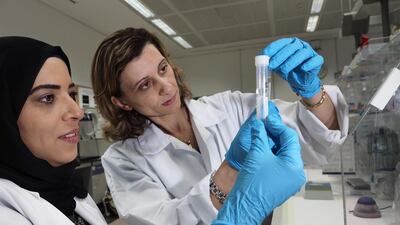Gene types common in Emiratis appear to make individuals more susceptible to developing diabetes, new research has found.
Scientists at Khalifa University and Zayed University have indicated that the genes, linked to vitamin D metabolism, are also associated with type 2 diabetes and could help to explain why both vitamin D deficiency and diabetes are prevalent in the population.
The UAE has one of the highest rates of diabetes in the world, with almost one in five affected, and the study suggests that factors other than diet and lack of exercise could be behind this.
Published in the Journal of Steroid Biochemistry and Molecular Biology, the research could ultimately assist with early interventions by making it possible to identify individuals at higher risk.
The study is centred on gene polymorphisms, which are variations between individuals in the DNA sequence of a particular gene.
By testing the genetic make-up of 264 diabetic Emiratis and 91 Emiratis without the condition, researchers found that certain forms of the vitamin D receptor (VDR) gene were linked to increased diabetes risk.
“We found that specific genotypes and specific polymorphisms from the vitamin D receptor genes were associated with type 2 diabetes mellitus (T2DM), and on the other hand, some could be protective,” said the study's main corresponding author, Dr Fatme Al Anouti, associate professor and assistant dean of the College of Natural and Health Sciences at Zayed University.
________________
Read more:
UAE spend on diabetes care falls well short of US and UK, study shows
Diabetes prevention programmes must be improved to avoid health crisis, report finds
Diabetes facility in Dubai expands to keep up with growing demand
________________
T2DM tends to develops later in life and involves high levels of sugar in the blood and insulin resistance. It can cause many harmful effects, including damage to the retina of the eye, heart disease and kidney problems.
A key finding, said Dr Al Anouti, was that the T2DM frequency among Emiratis was likely to be associated with the presence of the polymorphisms associated with the condition.
“This is what the paper tries to highlight actually and to show that some population-specific polymorphisms could be the reason why certain diseases are more prevalent in a given population,” she said.
“The polymorphisms do not have the same effect or association with a particular disease for all populations however.”
Although this is the first study of its kind to look specifically at the Emirati population, other research has found a link between vitamin D metabolism and T2DM in other groups, notably the Saudi Arabian population and in white people of European descent. Research on people from India, Turkey and China did not find the association.
Researchers say the racial background of Emirati individuals could help to determine whether they are likely to have a polymorphism that increases the likelihood of developing diabetes, or instead have one that decreases the likelihood.
The vitamin D receptor gene is thought to be associated with T2DM because a deficiency of vitamin D reduces insulin production by pancreas cells.
Genetic variation between individuals also influences the amounts of different cholesterols in the blood, which can impact how a person is affected by diabetes.
“It has been discovered that Vitamin D is not only involved in bone metabolism but also many other things, including glucose metabolism. The exact link is still to be fully elucidated,” said Dr Al Anouti.
“High cholesterol or hypercholesterolaemia is often a complication of uncontrolled type 2 diabetes and vice versa, and it could be a risk factor for diabetes.”
Dr Al Anouti said the results of the study could guide interventions for people with diabetes or early signs of the condition, although there is “still a lot of work to be done before we can conclude this”.
The researchers are looking at other genes involved in Vitamin D metabolism, and at links between obesity and Vitamin D deficiency.
The study had seven authors, with the senior author being Dr Habiba Al Safar, director of the Khalifa University Centre for Biotechnology and an assistant professor in the Department of Biomedical Engineering.


